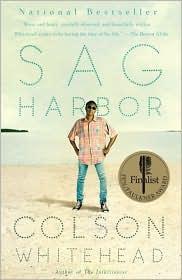kerry reviewed Sag Harbor by Colson Whitehead
Review of 'Sag Harbor' on 'Goodreads'
4 stars
I related to this book – even though my family never “summered” anywhere, and I’m not black, and I’m not a male. I related because, like narrator Benji and his friends, I know the word “dag.” If this expression is not in your vocabulary, hear it not as the clipped sound as if it rhymed with “bag”; it’s more like saying “dang” with a stuffy nose, and with a slight lilt to the a, drawing it out with a vocal inflection down.
“Dag” is usually followed by “that’s cold” (as in, you got served, that’s messed up).
And to young teenagers, working through the calculus of what’s “cold” versus what’s “cool” is of utmost importance. And who can’t relate to that?
Sag Harbor was refreshing and funny. Author Colson Whitehead writes with a strong sense of autobiography, but the tone is not at all wistful or maudlin. The events …
I related to this book – even though my family never “summered” anywhere, and I’m not black, and I’m not a male. I related because, like narrator Benji and his friends, I know the word “dag.” If this expression is not in your vocabulary, hear it not as the clipped sound as if it rhymed with “bag”; it’s more like saying “dang” with a stuffy nose, and with a slight lilt to the a, drawing it out with a vocal inflection down.
“Dag” is usually followed by “that’s cold” (as in, you got served, that’s messed up).
And to young teenagers, working through the calculus of what’s “cold” versus what’s “cool” is of utmost importance. And who can’t relate to that?
Sag Harbor was refreshing and funny. Author Colson Whitehead writes with a strong sense of autobiography, but the tone is not at all wistful or maudlin. The events take place in 1985, a kinder, gentler time, when parents could leave the kids unsupervised in the house all week.
Benji spends much time contemplating who he’s been and who he is yet to be. Finding his niche is important to him, as is fitting in, wearing the right clothes, listening to the right music. Calling “dibs” on the shotgun seat in the car is an art form. The boys go through some awkward dates and first jobs (conveyed as funny scenes at an ice cream stand). Benji, proud of his status as one of the oldest kids in the neighborhood, innocently observes: “Then on universal order we stopped fighting altogether. We were relieved. For one thing, we got bigger, and could do some damage.” But the damage does get worse, when the boys arm themselves with BB guns and the Labor Day bonfire begins to get out of hand.
So that’s why I relate to the book: it’s about how we all have to grow up. Dag.

